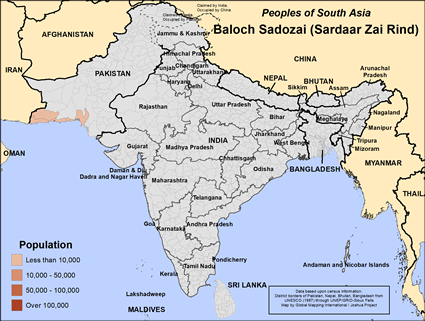Baloch Sadozai (Sardaar Zai Rind) in Pakistan

Send Joshua Project a photo
of this people group. |

Map Source:
People Group data: Omid. Map geography: UNESCO / GMI. Map Design: Joshua Project
|
| People Name: | Baloch Sadozai (Sardaar Zai Rind) |
| Country: | Pakistan |
| 10/40 Window: | Yes |
| Population: | 7,700 |
| World Population: | 7,700 |
| Primary Language: | Balochi, Southern |
| Primary Religion: | Islam |
| Christian Adherents: | 0.00 % |
| Evangelicals: | 0.00 % |
| Scripture: | New Testament |
| Ministry Resources: | Yes |
| Jesus Film: | Yes |
| Audio Recordings: | Yes |
| People Cluster: | Baloch |
| Affinity Bloc: | South Asian Peoples |
| Progress Level: |
|
Introduction / History
The name, "Baloch," is shrouded in controversy. Some say it means "nomad," while others claim that it is an old Persian word meaning "the cock's crest." Some believe the name "Baloch" is derived from the name of the Babylonian king and god Belus. Others believe the word is a derivation of Sanskrit words "Bal" meaning strength and "Och" meaning high or magnificent.
Their history is just as mysterious. Some have traced their origins to Nimrod, son of Cush (Noah's grandson). But while some things are uncertain, we do know that they first moved to the region in the twelfth century. The Baloch claim their origins to be in Aleppo in what is now Syria. They are descendants of Hazrat Ameer Hamza, the uncle of Islamic prophet Mohammed. Based on an analysis of the linguistic connections of the Balochi language, the original homeland of the Balochi tribes was likely the east or southeast area of the central Caspian region. During the Moghul period, this territory became known as "Balochistan." The Baloch homeland reaches from eastern Balochistan to southwestern Punjab, which borders India. This high, dry region was once a very populated country watered by a large number of flowing rivers. Today, it is a barren area of rocky mountains and dry river valleys mixed with desert land.
Baloch dialects are divided into three basic categories: Western, Eastern and Southern. From there they are divided into subgroups such as the Sadozai. Though there are Baloch people in Afghanistan, and even a small Diaspora in certain Gulf States, about seventy percent live in Pakistan, including the Sadozai subgroup. The Sadozai Baloch speak the Southern Balochi dialect.
What Are Their Lives Like?
Sadozai Baloch marriages are arranged between the bride's father and the prospective groom. There is a bride price of livestock and cash. Once a woman is married, she passes from the authority of her father to that of her husband. Marriages are monogamous and lifelong, and marrying a non-Baloch is strictly forbidden for most Baloch subgroups.
Balochmayar, or the "Balochiway," is the honor code by which the Sadozai Baloch live. These principles include extending hospitality and mercy, dealing with each other honestly, and offering refuge to strangers. They are preserved through both songs and poetry. Children learn proper behavior by watching their elders and are taunted whenever they misbehave. Baloch mothers pass traditions to children through oral history retelling. For many centuries the tradition of a Baloch mother singing lullabies to her children has played an important role in the transfer of knowledge from generation to generation. Gold ornaments such as necklaces and bracelets are an important aspect of Baloch women's possessions. They wear a gold brooch that is used to fasten two parts of the dress together over the chest.
Many Sadozai Baloch cannot read or write and until recently, their language was unwritten. However, they have a long tradition of poetic compositions. They give high status to poets and professional minstrels.
What Are Their Beliefs?
The Sadozai Baloch people embrace Sunni Islam as the core of their spiritual life. Their faith deeply influences their daily routines, moral values and social structures. They observe the five pillars of Islam with devotion, including daily prayers, fasting during Ramadan and making the pilgrimage to Mecca if possible. Religious leaders, known as mullahs, play crucial roles in guiding spiritual practices, resolving disputes, and leading religious ceremonies. The community gathers for Friday prayers at local mosques, reinforcing their sense of unity and spiritual commitment.
In addition to mainstream Islamic practices, the Sadozai Baloch people hold a profound respect for Sufi traditions. Sufi saints and shrines hold special significance, with many Baloch making pilgrimages to these holy sites. They believe in the intercessory power of saints and seek blessings and guidance through these visits.
Folk traditions also intermingle with their Islamic beliefs. The Sadozai Baloch recount stories of spiritual encounters, valor, and moral lessons through oral poetry and songs, which strengthen their cultural identity and moral values. They observe various religious festivals with enthusiasm, celebrating Eid al-Fitr and Eid al-Adha with community feasts, prayers, and social gatherings.
What Are Their Needs?
The Sadozai Baloch have been isolated for many years due to harsh climate, the difficulty of communicating in mountainous terrain, and their former reputation as bandits. Pakistan's Balochistan Province is very poor. Baloch communities often need adequate potable water sources, schools and hospitals. Above all, they need the chance to allow Jesus Christ to bless them with abundant life.
Prayer Points
Pray for the Lord to make a way for the Baloch to have a movement to Christ that will bless every subgroup materially and spiritually.
Pray for Sadozai Baloch families to be drawn by the Holy Spirit to seek forgiveness, and to understand the adequacy of Christ's work on the cross as the only payment for sin.
Pray that God will provide workers who speak the Balochi languages to work with the Sadozai Baloch people.